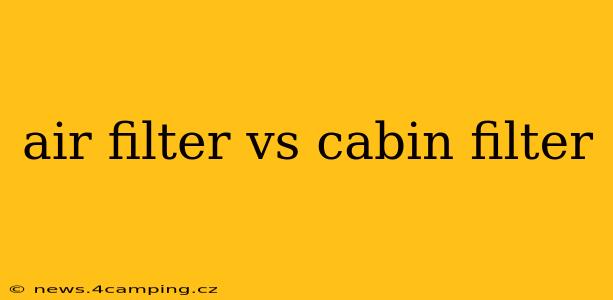Choosing the right filters for your car is crucial for both performance and health. Many drivers confuse the air filter and the cabin air filter, but they serve very different purposes. This guide clarifies the distinction, helping you understand when and why you need to replace each one.
What is an Air Filter?
The air filter is located in your engine compartment and protects your car's engine. It's a vital component responsible for filtering out dust, dirt, pollen, and other airborne contaminants from the air entering the engine. A dirty air filter restricts airflow, leading to reduced engine performance, decreased fuel efficiency, and potentially even damage to the engine over time.
Key Functions of an Air Filter:
- Protects the engine: Prevents abrasive particles from entering and damaging internal engine components.
- Ensures optimal fuel efficiency: Sufficient airflow is essential for efficient combustion.
- Maintains engine performance: A clean filter allows for the optimal air-fuel mixture, preventing power loss.
What is a Cabin Air Filter?
The cabin air filter, also known as the pollen filter or interior air filter, is located inside the vehicle's ventilation system. Its job is to clean the air that circulates within the passenger compartment. This filter traps dust, pollen, allergens, mold spores, and other pollutants, improving the air quality for you and your passengers.
Key Functions of a Cabin Air Filter:
- Improves air quality: Removes airborne contaminants, creating a cleaner and healthier breathing environment.
- Reduces allergens: Helps minimize exposure to pollen, dust mites, and other allergy triggers.
- Protects the HVAC system: Prevents dust and debris from clogging and damaging the heating, ventilation, and air conditioning system.
How Often Should I Replace My Air Filter and Cabin Air Filter?
The frequency of replacement depends on several factors, including driving conditions, climate, and the type of filter. However, general recommendations are:
- Air filter: Every 12,000 to 15,000 miles or as recommended in your vehicle's owner's manual. More frequent replacement may be necessary in dusty or harsh environments.
- Cabin air filter: Every 12 to 24 months, or every 15,000 to 30,000 miles. Again, more frequent changes might be needed in areas with high pollen counts or significant air pollution.
Ignoring filter replacement can lead to decreased performance, increased maintenance costs, and potential health issues. Always consult your owner's manual for specific recommendations.
What are the signs that my air filter needs replacing?
- Reduced engine performance: Noticeable loss of power or acceleration.
- Decreased fuel economy: Your car uses more fuel than usual.
- Rough idling: The engine runs unevenly at idle speed.
- Black smoke from the exhaust: This indicates incomplete combustion, potentially due to restricted airflow.
What are the signs that my cabin air filter needs replacing?
- Musty or foul odor from the vents: A sign that the filter is clogged with mold or bacteria.
- Reduced airflow from the vents: The air conditioning or heating system is not blowing as strongly as it should.
- Increased allergies or respiratory problems: If you or your passengers experience worsening allergy symptoms while in the car.
Can I replace my air filter and cabin air filter myself?
Replacing both filters is generally a relatively straightforward DIY task. However, the location and accessibility vary greatly depending on the vehicle model. Consult your owner's manual for specific instructions. If you're uncomfortable performing the replacement yourself, a mechanic can do it for you.
What type of air filter should I use?
Use the type of air filter specified in your vehicle's owner's manual. Using the wrong type of filter could affect engine performance or damage your car's systems. The same holds true for cabin air filters; select a filter appropriate for your vehicle.
This comprehensive guide aims to differentiate the functions, maintenance, and replacement of air filters and cabin air filters. Remember, regular maintenance of both is essential for optimal engine performance, fuel efficiency, and a healthier driving experience.
